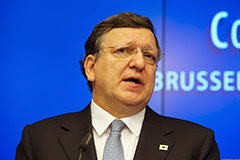 |
| Michael Ignatieff |
Said : Harvard professor and UN advisor Michael Ignatieff in an interview with Erich Follath of Spiegel published on September 9, 2014.
When asked : "Isn't former US President George W. Bush partly to blame for the current disaster thanks to his 2003 invasion, a war that you once endorsed," Prof. Ignatieff gave the following reply.
"Yes, he is. At the time I allowed myself to be fooled by the arguments being advanced by the US government, just as many others did. I regretted my endorsement and publicly admitted to my mistake. I have always been an interventionist, someone who believes that it is acceptable to violate a country's sovereignty for humanitarian reasons -- especially when a dictator is massacring his own people and when there is there a threat of genocide. I believed that was the case at the time. The only problem is that the US government manipulated public opinion."
Some key opinions expressed by Prof. Ignatieff, in the interview, are :
- Germany's decision to supply weapons to the Kurds is an important geostrategic and political signal which shows that Germany is assuming the central role in the Western alliance. Without this, Europe would be condemned to ineffectiveness.
- The Islamic State is an extremely dangerous force for all of the Middle East. If it consolidates, the Persian Gulf will also be destabilized, which could jeopardize the global oil supply.
- A solution that involves the United Nations Security Council - to fight the jihadists with armed force - would, of course, be the best. Russia and China, for different reasons, also fear an advance of the Islamic State, but they would rather be spoilers in the international system and let the blame for the collapse of order fall on the US.
- Those who are fighting the Islamic State militants are currently the lesser evil. It's a moral dilemma for the West but they must be provided all help. Also, the Americans should continue with their air strikes.
- I've been travelling to the Kurdish region for more than 25 years. It's remarkable what they have already achieved in their largely autonomous region within Iraq. In contrast to Baghdad, the administration works there, the economy is booming and religions are practised freely. It would be a shame if the West or the Kurds themselves jeopardized this successful experiment. And the Islamic State terrorists certainly can't be allowed to destroy it.
- Neither Assad nor the rebels, can win the conflict. The continued fighting will only cost more and more human lives. A status quo would result into a divided Syria but the Islamic State can been destroyed. For this, some rather strange, indirect alliances will have been created between both Assad and the West. I think it's the only way to end the slaughter of the civilian population.
- I know that this is a deal with the devil. It's hard to imagine an uglier tradeoff for peace and justice than this one. But continuing to demand Assad's removal without having real leverage to force it to happen has become an empty threat - an even more hopeless strategy. The alternative is more years of civil war, death and destruction.
- It's time for President Obama to examine whether Washington's strategic interests are really still identical with Israel's. I believe these interests have been drifting apart for a long time.
- I welcome a new, more self-confident German foreign policy. Merkel has the most influence in Europe and she has strong ties to both Kiev and Moscow. Putin isn't naïve. He knows how far he can go. The consequences of his actions can be bluntly explained to him.
- When a Russian leader says, even in jest, that he could take Kiev in two weeks, the danger is that we underreact, not overreact. It is important to strengthen NATO commitments, even deployments in the Baltic states, Poland and elsewhere. We also need to help the Ukrainian government, with arms and advisors to push back an invasion that is clearly Russian-backed and reverse the military momentum so that a negotiated political solution, favorable to Ukraine's survival as a united state, becomes possible.
- The Russians and the Chinese don't want R2P ("responsibility to protect") because it limits government sovereignty and permits - even demands, in an extreme case - outside intervention. Government sovereignty is an important value. Still, it can't be a license to commit mass murder within one's own borders. That's why we need responsibility to protect. The atrocities committed by the Nazis, right up to Pol Pot's Cambodian genocide and the genocide in Rwanda, have shown the world what is possible without an international standard. And you see it again today.
- People in democratic countries have become mistrustful of their political leaders, who - like Bush and (former British Prime Minister Tony) Blair in the 2003 Iraq war - are selling something under false premises. Leaders who, in this way, are betraying principles they claim to advocate. So the Western public believes, to quote a song by my favorite rock band, The Who: "Won't get fooled again."
- Combat operations in Iraq and Syria are unpopular in the United States, and in Germany more than two-thirds of the population is against sending weapons to the Kurds. Politicians in democratic nations cannot govern against the will of the majority, at least not in the long term. There is only one thing they can do: Campaign for their convictions. Otherwise we won't be able to prevent genocide in the future, either.






